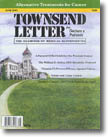


June 2003
by Robert R. Barefoot
review by Jule Klotter

Barefoot on Coral Calcium: An Elixir of Life?
by Robert R. Barefoot
Wellness Publishing
75 Plymouth St.
Fairfield, New Jersey 07004 USA
www.wellnesspublishing.com
Softbound, ISBN 0-9714224-1-9
2001, 144 pp, $19.95
Coral calcium from Okinawa has become
big business. Numerous web sites advertise it. Infomercials promoting
its health benefits play
on television. Curious about the product, I welcomed the chance to
review Robert R. Barefoot's book, Barefoot on Coral Calcium:
An Elixir of Life? While no one would question
the health benefits of a balanced intake of minerals, the superiority
of calcium from Okinawan
coral, taken as a supplement, is up for debate.
In his book, Mr. Barefoot draws on some research, usually without references,
to promote his Okinawan coral calcium (sold on the website www.naturesbenefit.com).
He begins by referring to long-lived groups such as the Abkasians from Georgia,
the Hunzas of Pakistan, the Vilcabambas of Ecuador, and the Okinawans. He writes, "I
believe that the common denominator in this group of people with longevity
is that their diet is high in mineral nutrients." He mentions Dr. Jun
Kobayashi, who found "a direct relationship between the 'hard water' that
is consumed by Okinawans and their long-and healthy life span" (author's
emphasis; no source for the quotation given).
The Okinawans are indeed a long-lived and healthy people, according
to a 25-year study headed by Dr. Makoto Suzuki. Mr. Barefoot
claims that Dr. Suzuki "has
repeatedly declared that the most important factor that determines longevity
in Okinawa is diet and nutrition." I managed to find an article on his
Okinawan study in The Boston Globe (May
22, 2001). Okinawa has the highest percentage of verifiable 100-year-olds
in the
world, and these people are healthy
with sharp minds. Their diet primarily consists of fresh produce and grains
with regularly servings of soy products and fish. The article goes on to
say that older Okinawans exercise regularly (most commonly, martial arts
exercises)
and maintain a positive spiritual attitude and low-stress lifestyle: "Exercise
is a way of life for Okinawans and it's connected to their spiritual
beliefs, which combine reverence for nature with celebration of elders and
ancestors and a 'help your neighbor' ethic in the community." Exercise
is well documented as strengthening bones and the cardiovascular system as
well as relieving stress. Community and social contacts are also documented
as being important for health. Who is to say how much of the health and longevity
enjoyed by older Okinawans is due to diet and how much is due to other factors?
Although Mr. Barefoot repeatedly states that mineral intake may not be the
only factor in the health and longevity of Okinawans, the book continually
emphasizes the health benefits of calcium, specifically Okinawan coral calcium.
Mr. Barefoot goes to great lengths to assert the superiority of Okinawan
marine coral, which contains about an "ideal" 2:1 ratio of calcium to
magnesium. Major elements found in Okinawan marine coral, according to his
own 'whole rock' analyses, include calcium oxide, magnesium oxide,
silicon oxide, strontium oxide, aluminum oxide, and iron oxide. Aluminum has
been implicated in illnesses such as Alzheimer's disease. Mr. Barefoot
does not address the aluminum content, except to list it in a table of principal
toxic elements (p 79). The heading to this table refers the reader to Appendix
A for the source and adverse effects of these toxic elements. The book does
not contain an appendix – "A" or otherwise. Since Mr. Barefoot
lists aluminum oxide and strontium oxide among the primary compounds in Okinawan
coral, his comment on toxic minerals was disturbing. Mr. Barefoot writes: "…minerals
that are traditionally considered 'toxic' may be very valuable
in small doses in biological systems. For example, the toxic element arsenic
has been shown in recent research to have a beneficial health role in minute
traces in the diet….As knowledge increases, we may have to redefine mineral 'toxicity.'
What was once considered toxic and undesirable in terms of small amounts
of certain
minerals may emerge as quite desirable for health. Also, every nutrient on
Earth is toxic in high enough quantities. Even excess water can kill, but
water is essential for life!" Anything is possible, but I found his argument
unconvincing. Nowhere in this book does Mr. Barefoot refer to any laboratory
or clinical studies on the use of Okinawan coral calcium, itself, when taken
as a supplement.
In addition to the lack of references and studies that support Mr. Barefoot's
claims, I was also troubled by the effect of harvesting from coral beds.
Mr. Barefoot explains in detail that the brand of coral calcium he recommends
is
harvested in a sustainable manner, supervised by the Japanese government.
Given the number of web sites and infomercials offering Okinawan coral calcium,
I
find it hard to believe that Okinawan coral reefs are not being affected – if
the contents of these products actually match the label. Pollution, global
climate change, even the swim fins of scuba divers are damaging coral reefs
all over the planet. Are Okinawa's coral reefs truly unaffected by mass
harvesting?
Okinawans who follow a traditional diet and lifestyle do enjoy excellent health
throughout their long lives. A 25-year study ascribed their health and longevity
to a diet based on produce grown in naturally-mineralized soil and a balanced
lifestyle that contains exercise, spirituality, gratitude, respect, and community.
Barefoot on Coral Calcium: An Elixir of Life? does
not contain evidence that taking supplemental coral calcium will produce
the same benefits. It is indeed
questionable that this widely-touted supplement is "An Elixir of Life."
Search
our pre-2001 archives
for further information. Older issues of the printed magazine are also
indexed for your convenience.
1983-2001
indices ;
1999-Jan. 2003 indices
Once you find the magazines you'd like to order, please use our
convenient form, e-mail subscriptions@townsendletter.com,
or call 360.385.6021 (PST).
All rights reserved.
Web site by Sandy Hershelman Designs
